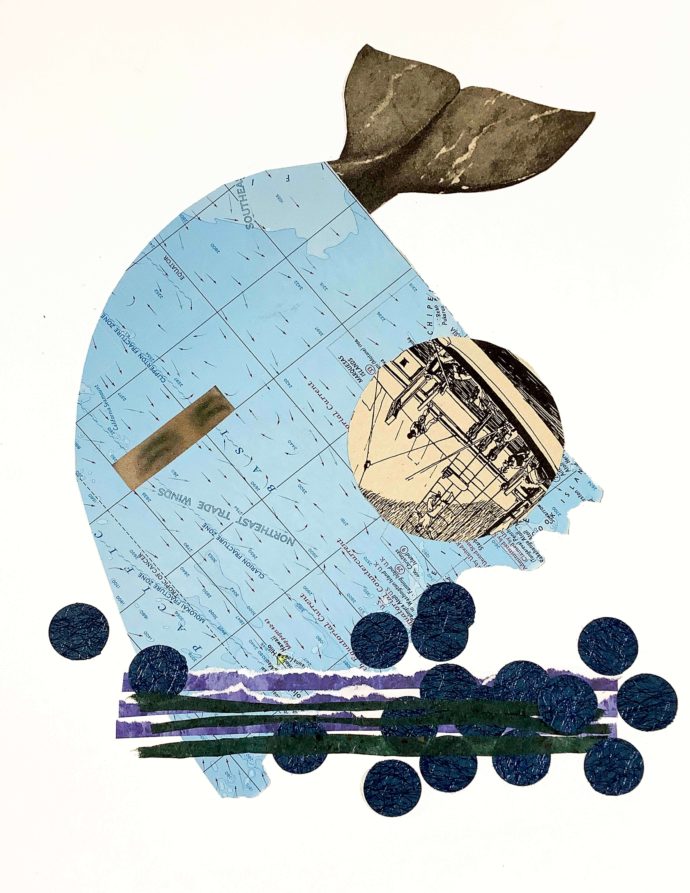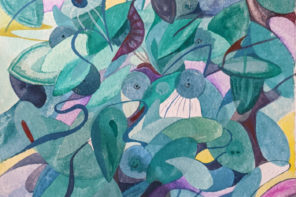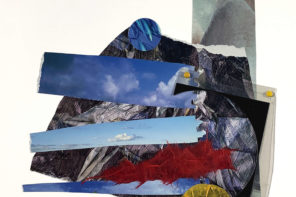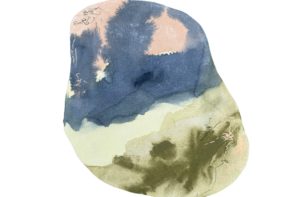I’m tucked in a favorite corner of my college library filling out an anonymous Psych 101 project survey. It’s supposed to be a boring little study break: click, click, click. I hesitate over the sexual orientation question. There’s something about being asked so anonymously and so abstractly, Who do you want? What are you? (not So, do you have a boyfriend/girlfriend?) that throws me out of autopilot.
Later, I will struggle to remember exactly how the options are worded and in what order they appear, but they boil down to four: straight, gay, bisexual, and questioning. (A small menu, even for 2008.) On every previous survey I’ve filled out, I’ve picked straight—assuming myself to be so in the absence of clear signals to the contrary. But this time, in the absence of clear signals, I click “questioning.” I leave the library and look out across the lake. It’s a beautiful spring evening and I take a long, meandering path back to my dorm.
This essay contains asterisks (from the Greek asteriskos, “small stars”): little risks, little symbols for what is omitted. They signal complications to be addressed elsewhere. They suggest provisionality—of thought, of language. They admit to unknowns. They constellate experiences and ideas that aren’t quite speakable. There’s a human tendency (or maybe a writerly one) to blame the void, to make an abscess of absence, to fill it with problem and mystery. But sometimes absence is just itself. And sometimes it is a guidepost, a north star.
A small green notebook falls out of my locker. A classmate starts to flip through it as she picks it up and asks me what’s in it. I panic and lie, blurting out that it’s a diary and contains lists of boys I have crushes on. The notebook is actually for poems and stories—these feel urgent and private in a way I can’t explain or justify—but I sense that “crushes” will have more validity with my classmate as a confidential matter. I’m trying to speak her language, trying to keep up with my peers at a moment when not having crushes has suddenly become weirder than having them. My classmate hands the notebook back.
What I do experience are word crushes—lingering obsessions with particular sounds. It delights me to spot certain words in print, to hear them spoken aloud, to tease out their meanings in the dictionary, to use them in my own writing. I smile, I swoon, I cast longing glances.
For years and years, my older half-sisters ask (in various terms) if I have a crush on any guys (“Or girls,” they begin to add) in my class. I know they are trying to bond with me, but I keep drawing a blank.
How long can you be a late bloomer before they decide you aren’t a plant at all?
Briar, fathom, render, porridge, enigma, benevolence, reckoning, eclipse, terrain, murmur, lapse, thistle, callow. No one asks me about these.
I’m trying on a black-and-white dress when my best friend tells me she is going to start dating after our college graduation. We’ve known each other since first grade. I tell her I’m still not interested. She mentions asexuality; she says she thought for a bit last summer that she might be asexual, but now she really does want to date men.
I’m more worried about finding a job or getting into graduate school than I am about pinning down my orientation. To change the subject, I ask if the dress makes me look like a zebra. What I really want to ask is if she will still love me when there is a vast gulf of experience between us.
“Yes,” my friend says, “but a cutely nerdy one.”
There are no clear answers, even in black and white. This is not the pivotal scene it could have been. I can’t read into it. My life seems full of such illegible moments, such hedges and discretions.
To be aromantic and asexual is to find oneself wearing assumptions that don’t fit, to find oneself veering from an expected life trajectory—following an absence or negation of markers, following a quiet inner logic. I’ve learned to inhabit the allosexual world so well, learned its language of attraction, adopted its narratives and values, that it takes me decades to realize I’m operating in a second language, constantly navigating, and translating. I don’t experience sexual attraction in a world where sexual attraction is assumed to steer our lives, where desire drives character and plot.
It’s hard to let go of the idea of falling in love—or rather, the narrative arc and the social affirmation having a partner would bring me. In a culture that has linked adulthood and agency with sexual experience (an assumption that is problematic for just about everyone), it’s hard to step off the map and out of chronology.
Even the word “orientation” requires a reckoning. One can only be oriented in relationship to others. Orientation implies a journey and a destination in a particular direction; it doesn’t invite interoception; it doesn’t encourage stepping back and disregarding the pre-established landmarks and milestones of adulthood, of narrative. Navigation, though, is a basic human need, and orientation is also the process of getting one’s bearings, becoming familiar, noting boundaries. Asexuality, for me, entails moments of disorientation—that inner dizziness that prompts me to pause and reconsider the terrain, to drink water and stretch my feet, to stop and look up at the sky or down at the roots of a tree. To choose, if necessary, an alternate route.
One of the first difficulties of coming out is that the very phrase “coming out” seems not to fit. I feel that I am already ‘outside’ the allosexual realm and that knowing for myself that I am asexual is a kind of inner reckoning, a homeward journey—a retreat from the performance of allosexual assumptions.
I google “asexual” shortly after relocating to California for grad school. Late afternoon sun pours in through the windows of my student housing unit. I withdraw into my tiny box of a bedroom so my roommate won’t see me (do I not want her to see “asexual” in my search box or do I not want her to see me freaking out about what I find?). I tell myself aloud, “I’m just eliminating a possibility,” but I know that I’m lying. My heart is beating too fast for this to be a multiple-choice question; this isn’t a survey for some stranger’s Psych project or a pop quiz I can guess my way through. It feels, at the moment, like the problem of my life.
I’m at a party in an apartment a few floors below mine and a man is flirting with me. He is smart and funny and friendly and athletic and has hazel eyes. In theory, this should be something I want, his leaning closer and putting his hand on my arm. But it’s a kind of out-of-body experience. I don’t feel threatened; I just feel deeply not myself, as though I’m under local anesthesia and not quite connected to my limbs, as though I’m trying to write with my left hand, as though I’m reading from a script written by someone else.
I step back and he lets me; he politely wraps up the conversation and turns elsewhere. I feel alive again. I leave the party a short while later.
When I google “asexual,” I read until my eyes are dry and burning. The first definition (“An asexual person is a person who does not experience sexual attraction”) presents a riddle: how can I know that I don’t experience sexual attraction if I don’t know what it feels like because I haven’t experienced it? But this very uncertainty is a kind of sureness; it has pressure and heft to it. I keep scrolling; I feel that gut-plummeting sensation of knowing something to be accurate and necessary. A kind of inner honing device kicks on.
I’m not cold, not hollow. I can finally name the mysterious glass wall I’ve sensed growing between myself and my peers since early adolescence. I can start to trace the dissonance between what I’ve read and watched and been told about love and sex and what I’ve felt. I’m unfrozen; I’m full of questions.
Every week I take a bus to the nearest stretch of beach and wade ankle-deep along the shore of the Pacific. I watch the tide go in or out; I lean towards labeling myself and lean away from it. I decide the real question isn’t what to call myself, or whether to tell other people, but what to do. There’s clarity and freedom in realizing that I might want and seek a life entirely without sex. I ask myself what else I might say no to, what I might choose instead. I decide to drop out of my anthropology program and apply to MFAs in creative writing. Much later, I will wonder if I was initially drawn toward anthropology because I felt that there was something I didn’t quite get about my own culture, because I wanted tools for observing and understanding the allosexual world. I’m only beginning to reread my life.
At five, one of my favorite picture books is called The Patchwork Lady. In it, a woman decorates her home (in an eccentric patchwork style) and bakes a cake with the help of a houseful of pets. She hosts dinner for a gathering of friends. At the end of the book, she waves goodbye to all her friends and returns contentedly to her solitary life. I want to be her when I grow up—to design my own home, to live near but not with friends, among cats and dogs.
It will take me a long time to realize what a strange book this is with its celebration of spinsterhood and creativity. I will love it all the more. I will want to gather all the different threads and parts of myself together and patch them into a whole, the way she does pieces of a crumbled cake.
Finishing my MFA in the Midwest, I’m back in a climate similar to the one I grew up in—with summer storms and overcast winters. But I often find myself mired in inner conflict: trying to express something that feels ineffable and personal while my introverted temperament squirms. I walk my dog around a patch of prairie every morning and watch deer vanish and reappear while I think about the things I can’t seem to write about. Not only is it hard to find words for asexual experience, it’s also hard to know if they are worth saying (for me, for those around me). I have a deep and instinctive sense of privacy—both my own and others’. I write a lot about my family, but I’m also protective of them; I suspect that, if I were allosexual, I would write (or choose not to write) with equal care and discretion about any sexual or romantic partners. Maybe, too, the idea of overtly announcing my asexuality clashes with my aesthetic (I’m a subtlety junkie, a nuancer). I’m never sure whether my modesty, my instinct to stay under the radar, to avoid attracting others’ attention, is innate or learned, whether it is tied to being asexual or if it is simply another thread in the fabric of my being.
Sometimes my reticence feels political, too. It feels wrong to announce my asexuality, to suggest sexual attraction isn’t a universal human experience, when my LBGTQ colleagues and friends are still struggling for equality. It feels potentially harmful to write about not experiencing sexual attraction in a world that is still hellbent on controlling women’s sexuality and their bodies—as if I would be handing ammunition to the abstinence-only crowd. If I follow this rabbit hole of thought too far, I start to wonder if my asexuality is, on some deep mind-body level beyond my conscious awareness, a political choice: a gut-level refusal of the metaphor of the sexual market and the objectification of women’s bodies.
I write and write around my silence and my questions. I write about my complicated family, about growing apart from childhood friends—about all the kinds of love and heartbreak I do feel. After one workshop, my teacher remarks that I write “unromantic love poems” and this feels true. I wonder if I’ve been writing aromantic and asexual poems all along without needing labels for them. I step out into the cloudy Midwestern dusk feeling, for a rare moment, at home in my own life.
I’m leaving a movie with friends who are talking about how hot an actor is; my teenage self trails behind and thinks instead about how the scenes were cut, how the score added to the suspense. I don’t have language for this any more than I have language for my (a)sexuality, but years later I will recognize these thoughts as writerly thoughts.
Why does absence require explicit framing, while presence is implicit? Am I really aromantic or just incapable of imagining an asexual romance? (What is the relationship between imagination and desire? We can imagine without desire, but can we desire without imagining?)
I move to Utah for yet another degree, building friendships and conversations around current projects and future plans, around the desert and the mountains. Still, every reference to Eden (and the reading list is full of these) is a reminder that Western culture has linked sexuality and knowledge; to be openly asexual, then, would be, on some level, to declare myself unknowing (and maybe also unknowable, maybe also unlovable) and inexperienced. I worry it would color every piece of writing I bring to workshop, not to mention my interactions with my own students. I worry about being seen as incapable of teaching or editing work with sexual content. As a white cis-gendered woman, I worry too about seeming to claim a diversity “ticket” that I don’t deserve. At the same time, when I get rejection letters describing my work as “lacking warmth” or reading “a little too cerebral,” I wonder how much the notion that “sex sells” shapes editorial decisions (consciously and unconsciously).
I walk my dog in a canyon in the Wasatch foothills, stepping through patches of light and shadow, warm and cold air, trying to outthink my silence. My silence is a mixture of fear and an awareness that the available language—the available labels—don’t quite express what I want to say. They feel accurate, but they also feel at once inadequate and overly prescriptive.
The asexual community has generated an abundance of terminology, including a host of labels that split sexual and romantic orientation and parse attraction into different types (aesthetic, romantic, sexual, intellectual). I’m grateful to have a framework for making sense of what does draw me toward certain people—their voices, their kindness, their ideas, their physical grace. But many of the words seem clinical and unmusical; they provide a spreadsheet rather than a map. I’ve always felt a bit allergic to categories and typologies, always been more inclined to see connection across a spectrum of variation than to use difference as a defining factor. None of the labels quite satisfy me (see how difficult it is to write in English without falling into allosexual metaphors).
What I’m really seeking are names for what I actually feel and want, not just labels for what I don’t feel or don’t want. As I pay more and more attention, I become aware of a wide range of subtle emotional and physiological responses, few of which I have labels for; many having nothing to do with attraction of any kind and more to do with recognition, empathy, resonance, memory, and mood, that I experience when I interact with others. It feels problematic to align myself with an identity of nonexperience rather than affirmed experience. Sometimes these handfuls of words feel fraught and insufficient and I wish for a whole new language.
I stand in the dust and toss sticks for my dog; I watch her refuse to fetch them. Her instincts lead her elsewhere.
It’s like writing a poem—considering syllables, weighing nuance, shuffling meanings, listening for what’s invoked, what’s evoked. Though still ambivalent about labels, I gravitate toward aroace. It’s a good enough descriptor—the least inaccurate—and I’m grateful to whoever thought to say it this way. A single arrow pointing nowhere. A hidden card, a game-changing factor. An alternate spelling with “sexual” removed altogether.
I walk without a map on a trail I’ve known since childhood. Pushed—no, pulled—back to my hometown by the pandemic and its aftermath, I walk every day. Sometimes I walk alone, sometimes with my dog, sometimes with a friend, sometimes with a ghost. The little trail is full of forks and branches, but they all eventually loop back to the heart of the park. My mind is full of words and questions, but I’m questioning metaphor and narrative these days rather than my own asexuality. So what if my life feels more cyclical, more lyrical than linear? I like circles. Spider silk catches on my glasses and I peel it away and keep walking, letting my footsteps echo on the little wooden bridges over the creek.
Ceridwen Hall is a poet and writing coach from Cincinnati. She holds a PhD from the University of Utah and is the author of three chapbooks: Automotive (Finishing Line Press, 2020), Excursions (Trainwreck Press, 2021), and fields drawn from subtle arrows (GreenTower Press, 2023). Her full-length collection, Acoustic Shadows, is forthcoming from Broadstone Books. Her work has appeared in TriQuarterly, Pembroke Magazine, Tar River Poetry, The Cincinnati Review, and other journals. You can find her at www.ceridwenhall.com.




